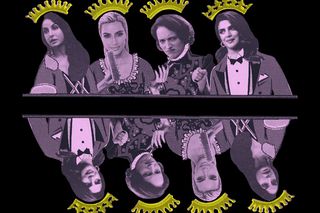
Why Is Feminism on the Internet Regressing?
From antifeminists to tradwives to "lobotomy-core," Internet trends have sparked a concerning pattern of regression in feminism overall.

Nora Fatehi, on a podcast episode with Beer Biceps, said that “feminism f*cked” society.” The internet today seems rife with new conversations every other day on the “real” meaning of feminism, with the most visible conversations on what feminism is and whether it has or hasn’t gone too far arguably undoing a lot of progress.
The dilution of feminism on the internet isn’t a new process, but it’s gathering steam again now. It began, arguably, with “choice” (read: White/ Savarna) feminism – a strand of feminism whose guiding principle was that every choice a woman makes for her own self-interest or enjoyment is a valid, feminist choice. Cue the karva-chauth ads, celeb photoshoots, and Priyanka Chopra fan-reels (which have also made a comeback now). Then, the more irony-poisoned version gained ground: Fleabag-inspired “dissociative feminism.” This was a unique aesthetic which can best be described as elite, beautiful young women self-destructing glamorously (thanks My Year of Rest and Relaxation). This then turned into the embrace of “bimbo-core” feminism, also known as “lobotomy-chic,” which in turn was a precursor to the trend of “girl” everything – dinners, math, etc.
It was only a matter of time before this collapsed into a revival of conservatism disguised as – you guessed it – “choice.” More recently, there was the infamous age-gap personal essay in The Cut, which made a case for marrying rich so that you don’t have to figure stuff out yourself. Related to that is the tradwife revival, courtesy Nara Aziza Smith, whose pleasant, Stepford Wife-esque demeanour has many wondering if quitting the paid workforce and staying at home (and performing unpaid labour for others) wasn’t such a bad thing after all.
All this prompts the question: what’s going on with feminism on the Internet – and are we going backwards?
Online feminism today seems to be driven by the ethos of wanting easy answers and longing for a return to easy definitions. The hyper-online conversations around feminism today are really post-feminist – in that they belong to a world in which feminism has achieved its ideals, at least as far as the individuals embodying these tropes are concerned. The self-destructive type is tired of feminism; the tradwife thinks it doesn’t serve her; the choice feminist rejects the idea that there’s only one way to be feminist; the girlboss positions herself as a role model to others who haven’t achieved what she has yet; the antifeminist thinks feminism should only apply to the lesser-privileged (Nora Fatehi, for instance, made an exception for girls’ education, which she thinks is “real” feminism). These spokespersons for feminism want things to be easy again, because the complexities rarely apply to them – and in some instances, the complexities directly challenge their positions of privilege.
How did we get here? It seems like the strategy in the early 2000s was convincing people that feminism was nothing to be afraid of. During the era when Bollywood celebrities (a lá Kareena Kapoor) distanced themselves from the word, the project on the Internet was to make the word as comfortable to associate with as possible. So it was stripped down to what seemed like the basics: feminism is equality for all. “Equality” became an uncomplicated, uncontroversial project, palatable for innumerable hashtags and Internet campaigns.
But what does equality – that nonspecific linguistic vacuum into which all activism disappears – even mean? One might think about the famous image of three people of varying heights looking over a fence. Equality is giving the shortest person the largest stool, so everyone can look over the fence. This was the definition we stuck to, because it made statistical sense. Women’s wages and education rates are quantifiable and, hence, can be proven to be abysmal in comparison to men’s. Logically, intuitively, equality makes sense, and is an Internet-friendly motto to rally behind. This seemed like sound reasoning to appeal to men and create campaigns to make feminism safe, non-threatening, and toothless. Enter Emma Watson’s #HeForShe campaign, and that other UN campaign platitudinously named MARD: men against rape and discrimination, which brought a lot of famous men on board. These campaigns took the easiest selling points – no decent man, after all, would be for rape and discrimination – and turned them into a rallying slogan for everyone, including brands and multinational corporations, to get on board and bolster their own progressive credentials. These were campaigns predicated on finding the most common denominator that could unite men’s sympathies with women’s interests, rather than getting to the heart of the systemic inequalities that keep men at an advantage at a cost to all women, especially trans, Dalit, Black women. In other words, instead of centering the most marginalized, Internet campaigns centered the most privileged.
But then came #MeToo – a colossus as far as Internet feminism was concerned and maybe the first real moment when digital feminist activism was truly possible. That was when magazines, blogs, mainstream publications, the media, Hollywood, Bollywood, and every aspect of society had tougher conversations about grey areas, about consent, about power, and how it wasn’t always possible to ascertain wrongdoing even if the injustice had been deeply felt. But like always, there was the insistence that influential people online speak in favour of the movement. Some did but many weren’t willing to venture beyond the truisms that had thus far become comfortable with them. Calling out exploitation, after all, is a much taller order than affirming that feminism stands for equality. It might impact one’s influence – and currency – online.
So when Johnny Depp vs Amber Heard happened – again, predominantly on the Internet – it set the clocks back. Fans flocked to defend Depp and viciously mocked and harassed Heard – with even domestic abuse survivors siding with Depp, and claiming him as a fellow survivor. This was the definitive MeToo backlash. Moreover, she was propped up as the example of what happens when feminism goes too far: you get “toxic femininity.” No wonder, then, that a common refrain was to call back to “equality” as a concept and hence pledge support for Depp as an equally legitimate survivor, per feminism’s own definition.
Post MeToo, thus, there is a widespread rejection of the idea that feminism is complex, implicates power, and complicates desire. The issues on the table are, once again, generic, simple, and sweeping: equal pay, access to education and equality for all. To champion these isn’t inherently wrong. But it’s the way they’re advocated for – oversimplified, banal, sans structural critique – that allows people to build a brand off of feminism without meaningfully furthering its aims.
We even had a blockbuster hit to cement the return of the “feminism = equality” oversimplification: Barbie. In press tours, Greta Gerwig, alongside Margot Robbie, was emphatic in her insistence that the film meant to convey that feminism is for men too (“it’s also a humanist film”; “anyone who believes men and women should be equal is feminist”). Unsurprisingly, it prompted some of us to wonder when we were catapulted back into 2015 or thereabouts, when pithy aphorisms like “feminism is for everyone” were rife on billboards, magazines, shopping bags, T-shirts, and corporate paperweights.
A lot of things look equal on the surface. It allows for people who seem to have achieved that equality to distance themselves from feminism now, while advocating it for others. Take Nora Fatehi, who in the middle of her tirade on the BeerBiceps podcast, argued that women are inherently nurturers. She was speaking as someone who advocates for empowerment for others who need it – it’s clear she doesn’t consider herself the target recipient of feminism. For women like her, then, who on paper are equal to men, feminism has gone too far.
Barbie, thus, feels like a product of disaffected cynicism with MeToo politics, buoyed by the implosion of the many sub-movements it sparked. It allowed for the resurgence of the most privileged type of self-styled feminists to center themselves: that’s how you get The Cut essay or Nora Fatehi's claims. As one former feminist blogger speaking to Jezebel noted, “White women are just more likely to marry money. That’s a really weird postscript to these things.” This is equally applicable to Savarna women online, who posit marriage, motherhood and care as sacred duties that are equally valid choices to be making as women. It shows that when privileged people with influence are in the position to set the terms of the conversation, they invariably speak for their own interests. For White/Savarna, wealthy women, health, education, housing, reproductive rights and more are already accessible – which means the feminist task for them is to give up their privileges – or use them for the benefit of others – as opposed to fighting for them. No wonder, then, that many opt for the convenient path and advocate for it as feminist, so as to sidestep guilt.
All it ultimately does is paint all women, irrespective of their positionality or actions, as immune to critique. That’s probably how we’ve ended up in a situation wherein questioning Taylor Swift’s private jet usage leads to angry rebuttals about why we don’t talk about other men’s private jets first. All this points to one possibility that, maybe, the problem was depending too much on influence to spread the word of feminism – because the influencers are guided by their own interests. Any ask beyond that is feminism going “too far.”
As many feminist thinkers have shown, individual actions can never change the culture. It took thousands of women to usher in a sea-change in the conversation about feminism during MeToo, and it was based on a shared sense of solidarity and a tacit understanding of how power and coercion work. It was an example of how the Internet can be a medium for systemic change, as opposed to an economy for individuals to acquire clout.
Rohitha Naraharisetty is a Senior Associate Editor at The Swaddle. She writes about the intersection of gender, caste, social movements, and pop culture. She can be found on Instagram at @rohitha_97 or on Twitter at @romimacaronii.
Related


Woe Is Me! “My Relationship Is Stagnating. How Do I Reignite the Spark?”
